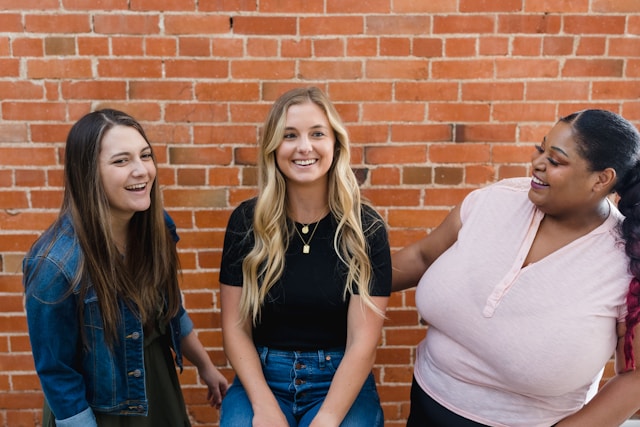A solid sense of humour is certainly an asset, but some people use it as a shield to hide their true selves.

Being the “funny one” might seem like a great role in any social group, but the ones who get the most laughs are often the ones dealing with the most pain and sadness behind the scenes.
1. Jokes deflect serious talk and hide true feelings.

People who always crack jokes during serious chats are often trying to avoid feeling exposed. By turning everything into a laugh, they build a wall that keeps everyone from seeing their real emotions or problems. It’s usually because they’re scared of being judged or find it hard to talk about their feelings openly.
2. Poking fun at yourself might mean you’re insecure.

A bit of self-deprecating humour can be charming, but doing it all the time often points to low self-esteem. When people constantly joke about their own flaws, they might be expressing real feelings of not being good enough. It can be a way to beat other people to the punch or fish for compliments from friends.
3. Humour as a peacekeeper shows trouble with tough talks.

Some folks use jokes to cool down tense moments or dodge arguments. While it might work in the short term, it often leaves real issues unresolved. This avoidance can come from being scared of conflict or not knowing how to handle disagreements well. Over time, it can lead to built-up tension and shallow relationships.
4. Non-stop joking might be a sign of nerves.

For some, being the ‘funny one’ is a way to handle anxiety in social situations. By focusing on making everyone laugh, they distract themselves from feeling nervous or uncomfortable. It becomes a go-to move for dealing with anxiety, but it might stop them from tackling the real reasons they’re anxious.
5. Humour as a wall shows fear of getting close.

Using humour to keep emotional distance can be a sign of being afraid of intimacy. By keeping things light and funny, people can avoid the vulnerability that comes with deeper connections. This often comes from past hurts or fear of rejection, making it tough to form close, meaningful relationships.
6. Seeking laughs might mean seeking love.

Some people become ‘the funny one’ to get attention they might have missed out on as kids or in important relationships. Always trying to be the centre of attention through jokes can be a way of filling emotional gaps. It might come from feeling neglected or deeply afraid of being overlooked or forgotten.
7. Laughter sometimes hides sadness.
 Source: Unsplash
Source: Unsplash Many people dealing with depression use humour to hide their pain. By keeping up a cheerful, funny front, they can avoid concern and sidestep their tough emotions. This happy mask can make it hard for other people to spot when they’re really struggling, which might delay getting help when they need it.
8. Relying on laughs for friends hints at deeper doubts.

For some, being ‘the funny one’ becomes their main way to make friends. This dependence on humour for acceptance can point to deep doubts about their own worth. They might worry that without their funny side, they’d be boring or unworthy of friendship, leading to constant pressure to entertain people.
9. Jokes as mood control suggest emotional struggles.

Using humour as the main way to handle emotions can show difficulty in processing and expressing feelings. Some people might use jokes to avoid uncomfortable emotions rather than facing them head-on. This can lead to emotional stunting and trouble dealing with life’s more serious moments.
10. Dark jokes might hint at hidden pain.
 Source: Unsplash
Source: Unsplash A tendency towards cynical or dark humour can sometimes point to underlying pessimism or past hurts. While this type of humour can be a way of coping with tough experiences, it might also reflect a negative view of the world. In some cases, it can be a cry for help or a way of testing if other people notice the pain behind the jokes.
11. Humour for control might mean feeling powerless.
 Source: Unsplash
Source: Unsplash Some people use humour to gain control in social situations or relationships. This behaviour can stem from feeling powerless in other areas of life. By being the one to make people laugh, they can steer conversations and feel more in charge. However, this can also lead to manipulative behaviour and difficulty in letting other people take the lead.
12. Constant jokes can be a way to avoid real issues.
 Source: Unsplash
Source: Unsplash For some, staying in the role of ‘the funny one’ is a way to avoid dealing with personal problems or life challenges. By keeping themselves and everyone else constantly entertained, they can dodge issues that need serious attention. This avoidance can lead to a pile-up of unresolved problems and get in the way of personal growth.
13. Humour as a shield often points to past hurts.

Using humour as a main defence often indicates past emotional wounds or trauma. By turning potentially hurtful situations into jokes, people can protect themselves from feeling vulnerable or getting hurt again. While this can work as a quick fix for emotional protection, it can also prevent healing and the formation of genuine, trusting relationships.
14. Always joking might mean dodging responsibility.

A constant need to inject humour into every situation can sometimes show a reluctance to face serious commitments or responsibilities. This might come from a fear of failing or not wanting to deal with the tougher parts of adult life. By always reverting to their funny side, people can avoid taking on serious roles or making big life decisions, potentially holding back their personal and professional growth.




